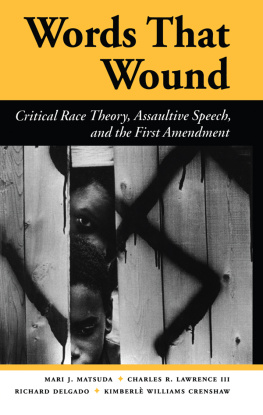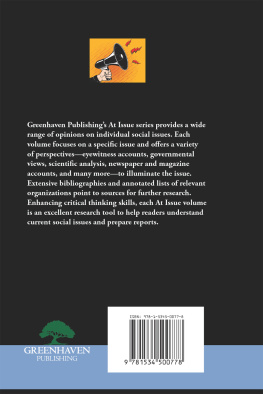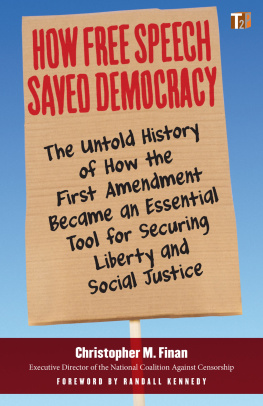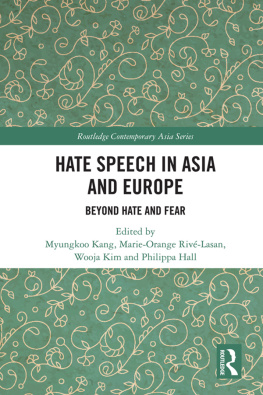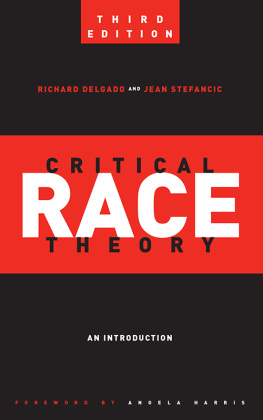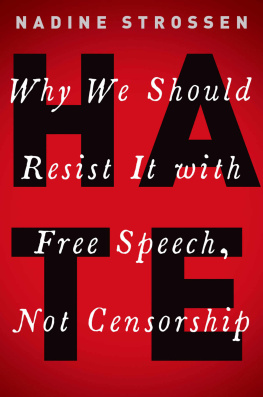New Perspectives on Law, Culture, and Society
First published 1993 by Westview Press
Published 2018 by Routledge
711 Third Avenue, New York, NY 10017, USA
2 Park Square, Milton Park, Abingdon, Oxon OX14 4RN
Routledge is an imprint of the Taylor & Francis Group, an informa business
Copyright 1993 by Mari J. Matsuda, Charles R. Lawrence III, Richard Delgado, and Kimberl Williams Crenshaw
Chapter 2 reprinted with permission from Mari J. Matsuda, Public Response to Racist Speech: Considering the Victims Story, 87 Mich. L. Rev. (August 1989); Chapter 3 reprinted with permission from Charles R. Lawrence III, If He Hollers Let Him Go: Regulating Racist Speech on Campus, Duke L.J. 431 (1990); Chapter 4 reprinted with permission from Richard Delgado, Words That Wound: A Tort Action for Racial Insults, Epithets, and Name Calling, 17 Harv. C.R.-C.L. L. Rev. 133 (1982)
Poetry excerpt on page 24 reprinted with permission from Lorna Dee Cervantes, Emplumada, (Pittsburgh: University of Pittsburgh Press). 1981 by Lorna Dee Cervantes
All rights reserved. No part of this book may be reprinted or reproduced or utilised in any form or by any electronic, mechanical, or other means, now known or hereafter invented, including photocopying and recording, or in any information storage or retrieval system, without permission in writing from the publishers.
Notice:
Product or corporate names may be trademarks or registered trademarks, and are used only for identification and explanation without intent to infringe.
Library of Congress Cataloging-in-Publication Data
Words that wound : critical race theory, assaultive speech, and the
First Amendment / Mari J. Matsuda [et al.].
p. cm. (New perspectives on law, culture, and society)
Includes bibliographical references and index.
ISBN 0-8133-8427-3 (cloth). ISBN 0-8133-8428-1 (pbk.)
1. Libel and slanderUnited States. 2. Hate crimesUnited
States. 3. Freedom of speechUnited States. 4. Racism in
language. I. Matsuda, Mari J., 1956II. Series.
KF9345.W67 1993
346.73034dc20
[347.30634]
92-41562
CIP
ISBN 13: 978-0-8133-8428-3 (pbk)

New Perspectives on Law, Culture, and Society
Robert W. Gordon and Margaret Jane Radin
Series Editors
Words That Wound: Critical Race Theory, Assaultive Speech, and the First Amendment, Mari J. Matsuda, Charles R. Lawrence III, Richard Delgado, and Kimberl Williams Crenshaw
Mind, Machine, and Metaphor: An Essay on Artificial Intelligence and Legal Reasoning, Alexander E. Silverman
Rebellious Lawyering: One Chicanons Vision of Progressive Law Practice, Gerald P. Lopez
Wittgenstein and Legal Theory, edited by Dennis M. Patterson
Pragmatism in Law and Society, edited by Michael Brint and William Weaver
Feminist Legal Theory: Readings in Law and Gender; edited by Katharine T. Bartlett and Rosanne Kennedy
FORTHCOMING
Intellect and Craft: Writings of Justice Hans Linde, edited by Robert F. Nagel
Property and Persuasion: Normativity and Change in the Jurisprudence of Property, Carol M. Rose
Failed Revolutions: Why Good Intentions, Great Promise, and Boundless Energy Fail to Transform the World, Richard Delgado and Jean Stefancic
The Philosophy of International Law: A Human Rights Approach, Fernando R. Tesn
In Whose Name? Feminist Legal Theory and the Experience of Women, Christine A. Littleton
Contents
, Charles R. Lawrence III, Mari J. Matsuda, Richard Delgado, Kimberl Williams Crenshaw
, Mari J. Matsuda
, Charles R. Lawrence III
, Richard Delgado
, Kimberl Williams Crenshaw
, Mari J. Matsuda and Charles R. Lawrence III
Guide
Words, like sticks and stones, can assault; they can injure; they can exclude. In this important book, four prominent legal scholars from the tradition of critical race theory draw on the experience of injury from racist hate speech to develop a first amendment interpretation that recognizes such injuries. In their critique of first amendment orthodoxy, the authors argue that only a history of racism can explain why defamation, invasion of privacy, and fraud are exempt from free-speech guarantees while racist and sexist verbal assaults are not.
The rising tide of verbal violence on college campuses has increased the intensity of the hate speech debate. This book demonstrates how critical race theory can be brought to bear against both conservative and liberal ideology to motivate a responsible regulation of hate speech. The impact of feminist theory is also evident throughout. The authors have provided a rare and powerful example of the application of critical theory to a real-life social problem.
This timely and necessary book will be essential reading for those experiencing the conflicts of free-speech issues on campusstudents, faculty, administrators, and legislatorsas well as for scholars of jurisprudence. It will also be a valuable classroom tool for teachers in political science, sociology, law, education, ethnic studies, and womens studies.
Mari J. Matsuda is professor at the School of Law and at the Center for Asian American Studies, University of California-Los Angeles. Charles R. Lawrence III is professor of law at Stanford University. Richard Delgado is Charles Inglis Thomson Professor of Law at the University of Colorado. Kimberl Williams Crenshaw is professor of law at the University of California-Los Angeles.
Allport, Gordon W. The Nature of Prejudice (1954).
Arkes. Civility and the Restriction of Speech: Rediscovering the Defamation of Groups , 1974 Supreme Court Review 281.
Ball, Milner. The Legal Academy and Minority Scholars , 103 Harvard Law Review 1855 (1990).
Banks, Taunya L. Two Life Stories: Reflections of One Black Woman Law Professor , 6 Berkeley Womens Law Journal 46 (1991).
Barnes, Robin D. Race Consciousness: The Thematic Content of Racial Distinctiveness in Critical Race Scholarship , 103 Harvard Law Review 1864 (1990).
Bartlett, Katharine T., and OBarr, Jean. The Chilly Climate on College Campuses , 1990 Duke Law Journal 574 (1990).
Bell, Derrick. And We Are Not Saved: The Elusive Quest for Racial Justice (1987). Race, Racism and American Law (2nd ed. 1980).
Bogle, Donald. Toms, Coons, Mulattoes, Mammies, and Bucks: An Interpretive History of Blacks in American Films (1973).
Bollinger, Lee C. The Tolerant Society: Free Speech and Extremist Speech in America (1986).
Brownmiller, Susan. Against Our Will: Men, Women and Rape (1975).
Caldwell, Paulette. A Hair Piece: Perspectives on the Intersection of Race and Gender , 1991 Duke Law Journal 385 (1991).
Calmore, John O. Exploring the Significance of Race and Class in Representing the Black Poor , 61 Oregon Law Review 201 (1982). Toward Archie Shepp and the Return of Fire Music: Voicing Critical Race Theory and Securing an Authentic Intellectual Life in a Multicultural World 64 Southern California Law Review (1992).
Chused, Richard H. The Hiring and Retention of Minorities and Women on American Law School Faculties , 137 University of Pennsylvania Law Review 537 (1988).
Clark, Herbert. Psychology and Language: An Introduction to Psycholinguistics (1977).
Colker, Ruth. Anti-Subordination Above All: Sex, Race, and Equal Protection , 61 New York University Law Review 1003 (1986).

